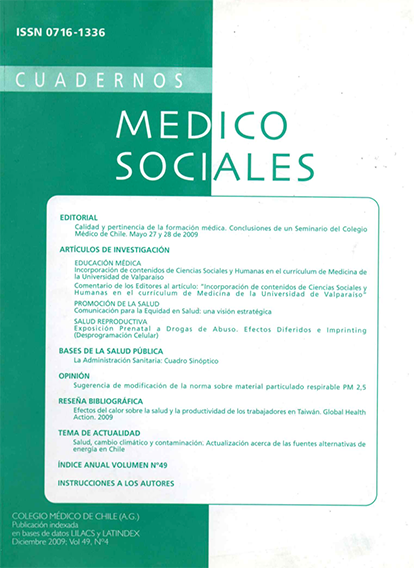Health, climate change and environmental pollution. Present status of the alternative energy sources in Chile
Keywords:
health, climate change, energy sources, energy policies, role of the Ministry of HealthAbstract
The risks and damages that arise from the utilization of fossil fuels as sources of electricity and of energy for transport and industrial activities are now undisputable. In spite of this, many countries still have or tolerate plans for the continuing dependence on those non-renewable sources. In Chile there are many such projects. In support of this, it is argued that national economic growth absolutely requires the increased use of coal, petroleum and gas. This is not true; the validity of the argument depends on what society decides. Since time immemorial, man has utilized natural energy sources, besides his own and animal strength: the sun, wind, firewood, the movement of river and of sea water, termal spas. Today, we know how to harness them as sufficient alternatives in respect to the sources that through climate change and pollution are a menace to the health of mankind and to life in general. The arguments in favour of these alternative sources “of a first type” are that they are clean, safe, inexhaustible within the frontiers of all countries. For several of them, their short term technological and economic feasibility is already a fact. At the same time we should bear in mind the availability of “second type alternatives” which present serious problems. Some of them are unsafe and generate radioactive contamination: the atomic plants; in the case of Chile they would perpetuate dependence on foreign sources of fuel. Others bring about permanent environmental destruction, generate greenhouse gases and present a real danger of catastrophic accidents: these are the great barrages for hydroelectric power. Still others compete for the soil required to produce food and ecological regulation, besides also producing greenhouse gases: these are the biofuels. The largest of these facilities take a long time to plan, finance and build and therefore will arrive too late make a significant contribution to the economy, in competition with the “first type” alternatives, particularly if these receive government support and if energy efficiency is taken care of. This research paper presents the facts that are relevant to Chile, a country that is abundantly endowed with clean natural energy resources. On this basis we argue for the need of just and timely energy policies: policies concerning energy in its connection with health and nutrition; science, technology and education policies in their relation with energy; energy and environment policies; regular publication of the indicators of greenhouse gases emission. And as a foundation of all of them, a sustainable development policy, with control over the penetration and management of technologies, a policy to preserve national independence in regard to energy sources and to the utilization of their products.
Downloads
Downloads
Published
How to Cite
Issue
Section
License

This work is licensed under a Creative Commons Attribution-NonCommercial-ShareAlike 4.0 International License.


